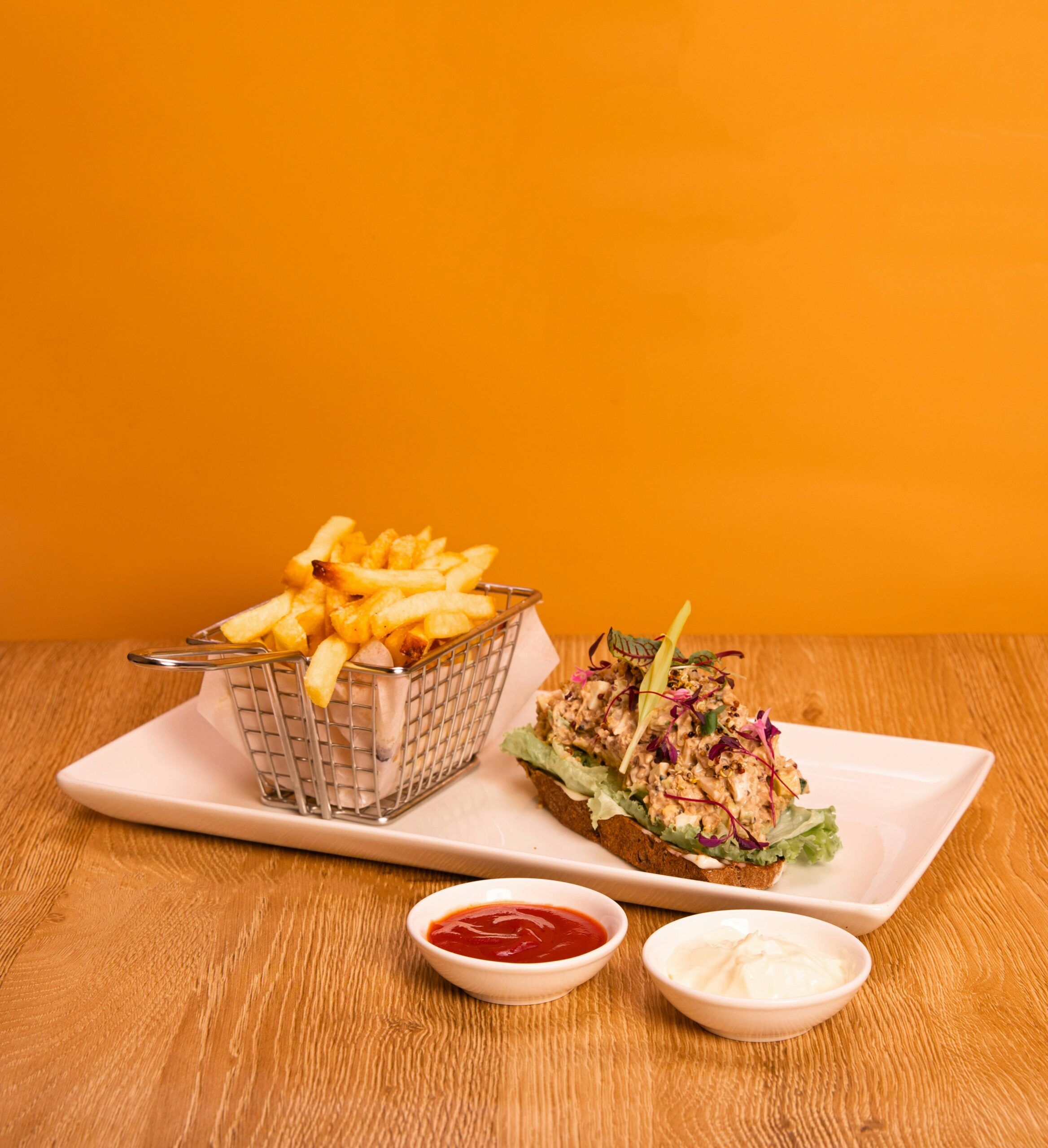- Unpacking Machine Learning And AI In Restaurants
- Personalizing The Dining Experience With AI
- Streamlining Operations With Predictive Analytics
- AI-Assisted Dispute Management Assistance
- AI-Powered Marketing Automation
- Challenges And Solutions In Implementing AI In Restaurants
- Future-Proof Your Restaurant With Orders.co’s AI Features
- FAQ
Think about the last time you tackled the daily challenges of your restaurant. Now, imagine those tasks streamlined or even automated.
That’s the power of AI and machine learning—tools that are no longer reserved for tech giants. Today, they’re accessible, affordable, and incredibly effective, even for your eatery.
Source: Restaurant 365
What does this mean for you? It means spending less time on spreadsheets and more on what you love—creating unforgettable dining experiences.
AI can manage everything from predicting your busiest hours to crafting personalized marketing campaigns that actually speak to your customers’ tastes.
Let’s explore how these smart technologies can not only keep your independent restaurant running but help it thrive in a competitive market.
Key Takeaways
- AI significantly enhances operational efficiency in restaurants by automating tasks and predicting business needs.
- Personalized customer experiences through AI lead to higher satisfaction rates and repeat visits.
- AI-driven marketing tools enable targeted campaigns that are more effective at engaging customers.
- Implementing AI requires careful integration with existing systems but provides substantial long-term benefits.
- Ethical use of AI involves ensuring data privacy and avoiding bias to maintain trust and compliance.
Unpacking Machine Learning And AI In Restaurants
What exactly are AI and Machine Learning? These terms might sound complex, but their application in your restaurant is straightforward. AI refers to systems designed to make decisions, often replacing manual human processes.
Machine learning is a subset of AI focusing on algorithms that learn from data and improve over time without direct programming. In your restaurant’s context, these technologies can adapt and optimize based on real-time data from your operations.From scheduling staff more efficiently to predicting the popularity of dishes and creating descriptions, these tools digest the numbers and patterns that define your daily business. This isn’t about replacing your kitchen’s human touch. Instead, it’s about enhancing efficiency to focus more on guest satisfaction and less on backend management.
Personalizing The Dining Experience With AI
Imagine a system that knows your regulars’ favorite dishes before they even order. AI in your restaurant can analyze past orders, preferences, and even the time of day to offer tailored suggestions through your POS system or digital menu.
This level of personalization doesn’t just enhance customer satisfaction; it also increases the likelihood of repeat visits.
For instance, if someone frequently orders a vegan burger, AI can recommend the latest addition to your vegan offerings the next time they dine.
This proactive approach doesn’t just make your guests feel special—it also boosts your sales by making personalized upselling seamless and effective.
Also, read:
- AI For Restaurants: Top 5 Restaurants Using AI And Machine Learning For Growth
- Beyond Traditional Advertising: Innovative Marketing Strategies for Restaurant Expansion
- Strategic Growth: Success Stories from Expanding Restaurants
- Mastering Restaurant Finances: A Data-Driven Approach
- Exceeding Expectations: Enhancing Customer Experience to Drive Restaurant Growth
Streamlining Operations With Predictive Analytics
Efficiency is crucial in the fast-paced environment of a restaurant, and AI and machine learning are transforming this aspect by enabling effective predictive analytics. These technologies help optimize daily operations in several impactful ways:
Demand Forecasting
AI analyzes past transaction data, local events, and even weather patterns to forecast busy periods. This lets you adjust staffing levels and inventory in real-time, ensuring you’re always prepared, never overstaffed, or understocked.
Your Inbox, Your Rules!
Tailor your newsletter with the topics you're most interested in.
Inventory Management
- Reduce Waste: By predicting the quantity of ingredients needed each day, AI helps minimize waste, saving costs and resources.
- Automatic Reordering: Set thresholds that trigger automatic reordering of stock, ensuring you never run out of essential ingredients.
Labor Optimization
- Scheduling: AI suggests optimal staff schedules based on forecasted restaurant traffic, which improves employee satisfaction by avoiding understaffing or overworking.
- Task Allocation: Assign roles and responsibilities more effectively during shifts, keeping operations smooth and efficient.
Menu Management
- Copywriting: Create delicious-sounding ai generated menu descriptions with the help of the AI in spelling, grammar, and overall readability.
Integrating AI into your operational backbone ensures that your restaurant meets the current demand efficiently and adapts proactively to expected changes, enhancing both customer satisfaction and operational efficiency.
AI-Assisted Dispute Management Assistance
AI-assisted dispute management can revolutionize how your independent restaurant handles chargebacks, enhancing efficiency and revenue protection.
Here’s a breakdown of the capabilities this sophisticated system offers:
- Smart AI Assistance: Our AI chargeback assistant automates the dispute resolution process and learns from each interaction, improving its effectiveness and success rate over time. This smart system helps you safeguard your revenue more efficiently.
- Immediate Alerts: Receive instant email notifications once a chargeback is issued. This feature enables proactive management of disputes, ensuring you’re always prepared to respond swiftly and effectively.
- Effortless Dispute Submission: Simplify the submission process with our intelligent system, which offers data-driven recommendations for selecting the most relevant dispute reasons. This allows for quick and accurate dispute resolution with just a few clicks.
- Transparent Case Tracking: Our tracking system keeps you informed about the status of each dispute, categorizing them as “new,” “processing,” or “completed.” Detailed explanations are provided for cases that are rejected to help you understand and rectify any issues.
- Flexible Customization: Tailor the dispute management process to fit the unique needs of your restaurant. Choose from manual handling or opt for our automated resolution feature, available as a premium upgrade, to increase your operational efficiency.
- Seamless POS Integration: Our system integrates seamlessly with over 30 different POS systems, ensuring consistent and accurate synchronization of your operational data. This integration enhances overall business efficiency and maintains data integrity across your platforms.
By leveraging these advanced tools, your restaurant enhances its ability to handle disputes and boosts customer satisfaction by resolving issues quickly and effectively.
This section of AI-driven solutions is vital to modernizing your restaurant’s operations and staying competitive in the industry.
Schedule a 15-minute Demo to see how this and other Orders.co’s AI-enhanced tools can help your business!
AI-Powered Marketing Automation
Harness the power of AI to streamline your restaurant’s marketing efforts, ensuring that every customer interaction is personal and practical.
Here’s how you can transform your marketing strategies using AI:
- AI-Powered Automated Text Campaigns: Elevate customer engagement with custom SMS engagement that mirrors your unique branding. AI-assisted promotions use past order data to send targeted offers that resonate with individual preferences. Features like instant text coupons and quick menu updates keep your patrons informed and excited, thus driving sales and enriching their dining experience.
- Advanced Email Marketing: Implement advanced marketing strategies that dispatch emails that feel personal and relevant to each recipient. Automated campaigns save precious time and facilitate timely communication, keeping your customer base engaged. Integrate your loyalty programs with your email marketing efforts to incentivize repeat visits from your regular diners further.
Source: Instapage.com
- Professionally Designed Printed Materials: Utilize AI tools to create aesthetically pleasing QR codes and menus that align with your restaurant’s ambiance and simplify the ordering process. Update your physical marketing materials effortlessly using custom templates that spotlight new promotions or menu items. Manage reorders of essential items like menus and QR cards seamlessly through a centralized platform.
By adopting AI-powered marketing automation, you position your restaurant to meet your customers’ needs better while driving your business forward.
Schedule a 15-minute Demo to see how this tool can help your business optimize your marketing efforts!
Challenges And Solutions In Implementing AI In Restaurants
Integrating AI into existing systems within a restaurant poses significant challenges, but with the right approach, these can be navigated successfully.
Integration Challenges
Ensuring seamless compatibility between new AI solutions and existing Point of Sale (POS) systems, booking platforms, and customer relationship management (CRM) tools is crucial. Disparate systems can lead to fragmented data and inefficient operations.
How to Overcome: Opt for AI solutions that support widespread POS systems or offer customizable APIs for easier integration.
Data Privacy and Security
Protecting customer data is paramount when implementing AI, as these technologies utilize extensive customer information to operate effectively. The risk of data breaches is a significant concern.
How to Overcome: It’s essential to choose AI solutions that adhere to data protection regulations such as GDPR or CCPA to safeguard data. Implement strong cybersecurity measures, including encryption, secure data storage, and regular security audits.
Training and Usability
The transition to AI can be challenging for staff, potentially leading to resistance due to the complexity of new technologies.
How to Overcome: Overcome this by selecting AI tools with user-friendly interfaces and providing comprehensive training to ensure staff can manage these systems effectively.
Cost and ROI Considerations
The initial investment in AI technology can be substantial, and the return on investment (ROI) may not always be immediate.
How to Overcome: To reduce financial risks, start with lower-cost AI applications that demonstrate clear benefits, such as automated reservation systems or customer feedback analysis tools.
By proactively addressing these challenges with strategic solutions, restaurants can fully leverage AI to streamline operations, enhance customer service, and maintain a competitive edge in the industry.
Future-Proof Your Restaurant With Orders.co’s AI Features
As we wrap up this exploration of AI and machine learning in the restaurant industry, it’s clear that these technologies offer transformative benefits.
From personalizing the dining experience to automating complex operations, AI is not just a futuristic concept but a practical tool readily available to help your restaurant thrive in a competitive market. By integrating AI, you can enhance customer satisfaction, optimize your operations, and ensure that your restaurant keeps pace with industry trends and sets new standards.
At Orders.co, we understand AI-enhanced features’ pivotal role in modernizing restaurant operations. Our suite of tools is designed to seamlessly integrate into your existing systems, bringing a new level of efficiency and customer engagement to your business:
Direct Ordering Website With Mobile Optimization
Ensures that your custom ordering website is fully optimized for mobile devices, providing a fast and smooth browsing experience that encourages customers to place orders on the go or at home.
Online Restaurant Orders Management
Streamlines operations by consolidating all incoming orders—from your website, app, or third-party platforms—into a single online orders management platform with a unified dashboard, enhancing customer satisfaction and operational efficiency.
Menu Management
Menu management offers a user-friendly dashboard that allows for quick updates to menu items, adjustments to prices, and the launch of special promotions, keeping your offerings fresh and accurate across all platforms.
AI-Powered Marketing Solutions
AI-enhanced marketing solution uses AI to automate customer interactions and craft targeted marketing campaigns that significantly increase order volume and improve customer retention.
Loyalty Reward Program
Facilitates an automated mobile loyalty rewards system that rewards frequent customers, enhancing customer engagement and fostering brand loyalty.
Local SEO Optimization
Local business optimization improves your restaurant’s visibility in local search results, manages your online presence across directories, and optimizes your Google My Business profile.
Reporting and Integrations
Provides comprehensive reporting tools for actionable insights and integrates with over 30 POS and third-party apps, ensuring consistency and reliability in your operations.
If you’re ready to see how our tools can transform your restaurant, schedule a 15-minute demo today and take the first step towards a more efficient and profitable future.
FAQ
1. What are the initial steps to integrating AI in restaurants?
Begin by evaluating your current technological setup and identify areas where AI can make the biggest impact, such as customer service, inventory management, or marketing efforts.
2. How can AI for restaurants improve customer satisfaction?
AI enhances customer satisfaction by personalizing dining experiences, accurately predicting order preferences, and efficiently managing reservations and wait times, leading to faster service and tailored interactions.
3. Are there specific types of AI applications suited for small or medium-sized restaurants?
Yes, smaller establishments can benefit from cost-effective AI tools like simple chatbots for customer interaction, automated marketing solutions, and basic analytics tools that provide insights into customer preferences and behavior.
4. What are the ethical considerations when implementing artificial intelligence in the restaurant industry?
Ethical considerations include ensuring customer data privacy, being transparent about AI’s role in customer interactions, and avoiding bias in AI algorithms that could affect customer service or employee management.
5. How does AI impact the roles of restaurant staff?
AI in restaurants is designed to augment the capabilities of human staff by taking over repetitive, time-consuming tasks, allowing staff to focus on more complex and guest-focused activities.
6. What future trends should restaurant owners expect with AI in the restaurant industry?
Future trends include more advanced predictive analytics for demand forecasting, AI-driven kitchen management systems for optimizing food preparation processes, and increasingly sophisticated customer interaction tools that offer highly personalized dining experiences.
7. How can AI for restaurants help in managing supply chain and inventory?
AI can optimize inventory levels by predicting future demand more accurately, automate ordering processes, and help track supply chain movements in real time to avoid shortages or overstock situations.
8. Can AI help restaurants in managing compliance with health and safety regulations?
AI tools can monitor compliance with health and safety regulations by tracking kitchen conditions, employee hygiene practices, and the storage and handling of food, ensuring that restaurants meet all regulatory requirements consistently.
9. What are the cost implications of adopting AI in restaurants?
While initial setup costs can be significant, the long-term savings and increased efficiency often offset these expenses. Additionally, many AI solutions offer scalable pricing models to accommodate different business sizes and budgets.
10. How do I measure the ROI of implementing AI in my restaurant?
Measure ROI by tracking improvements in operational efficiency, reductions in labor costs, increases in customer satisfaction scores, and growth in average order value or frequency of visits.



